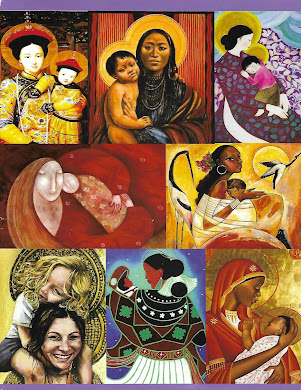Dear Friends,
The November liturgical readings prompt us to ask: Life.
Death. Then what? The answer to that question has changed in history as people’s
core values have changed.
If you were an Egyptian monk three centuries before Christ,
you would think of this life as an antechamber – a prelude. Real life would
happen after death. Still, a person couldn’t just sit around and do nothing,
waiting for this life to be over. So the monks took up basket-weaving, weaving
and unweaving the same basket throughout their lives. In doing this, the
Egyptian monks underscored their sense of the futility of life.
The Greek philosopher Plato spoke of death as the releasing
of the soul from the prison of the body – not a very positive way of viewing
either the body or this life, which for us can only be embodied.
One element of genius in Judaism is that it did value this
life, with all its challenges, victories, and defeats.
Belief in the resurrection of the dead emerged relatively
late in the history of Judaism. Jews came to believe not that their bodies
would be resuscitated or that their earthly lives would simply be prolonged,
but that God would transform them entirely.
Today’s first reading comes from this Jewish perspective. We
read the second century B.C. story of a mother with seven sons. Encouraged to
remain faithful to God by their mother, all seven sons died, rather than
abandon their faith. In dying, they reaffirmed their belief that they would live
with God in a new way. To sum up what was taught by the experience of the
mother with her seven sons, we can say Life is treasured. Death is a
passage. New life lies beyond.
A few centuries later, Jesus would embody these beliefs in
His very person, as He died, rose, and appeared to many. But already in his
public life, Jesus dealt with the meaning of life, death, and eternity. In
today’s Gospel, Jesus encounters a group of Sadducees who understood the
resurrected life as a simple extension of this life. Thus, they told the story of
a woman who married seven brothers successively, according to an ancient Levirate
law. No, Jesus told them. This life and the resurrected life are different but
related realities. Moreover, the resurrected life is beyond our imagination and
inventiveness and rests with God’s own creativity and freedom.
Today: Life. Death. Then what? Life around us is so full of
misery, injustice, pain, and cruelty that it would be unbearable if there were
not more. But if life beyond this life is not merely a continuation of what we
have been and known, then what is it? What can we say about eternal life,
heaven, whatever we call it?
The first thing we can say is that Love Endures. We
have only to think of our loved ones who have crossed the threshold of death.
We continue to experience them through dreams, feelings, help apparently from
nowhere.
The second thing we can say about life beyond death is that God’s
compassion and promises will prevail according to our capacity to take
them in.
You and I, all people, are destined for life. Believing
this, we put aside the things that don’t matter in life, we put human cruelty
and carelessness into perspective and welcome the conviction that we are
destined for eternal life. We are loved by the God of the living.
~Sister Joan Sobala






